E. Gabriella Coleman: Coding Freedom: The Ethics and Aesthetics of Hacking (2012–) [EN, SC]
Filed under book | Tags: · aesthetics, anonymous, anthropology, code, computing, ethics, floss, free software, hacker culture, hacking, intellectual property, internet, internet activism, software, web

“Who are computer hackers? What is free software? And what does the emergence of a community dedicated to the production of free and open source software–and to hacking as a technical, aesthetic, and moral project–reveal about the values of contemporary liberalism? Exploring the rise and political significance of the free and open source software (F/OSS) movement in the United States and Europe, Coding Freedom details the ethics behind hackers’ devotion to F/OSS, the social codes that guide its production, and the political struggles through which hackers question the scope and direction of copyright and patent law. In telling the story of the F/OSS movement, the book unfolds a broader narrative involving computing, the politics of access, and intellectual property.
E. Gabriella Coleman tracks the ways in which hackers collaborate and examines passionate manifestos, hacker humor, free software project governance, and festive hacker conferences. Looking at the ways that hackers sustain their productive freedom, Coleman shows that these activists, driven by a commitment to their work, reformulate key ideals including free speech, transparency, and meritocracy, and refuse restrictive intellectual protections. Coleman demonstrates how hacking, so often marginalized or misunderstood, sheds light on the continuing relevance of liberalism in online collaboration.”
Publisher Princeton University Press, 2012
Creative Commons Attribution-NonCommercial-NoDerivs 3.0 License
ISBN 1400845297, 9781400845293
264 pages
Responses: Jo Bates, Denisa Kera, Brett Lunceford, Jorge Luis Zapico, Alexander Halavais, Stéphane Leman-Langlois, Ethan Zuckerman
Reviews: James Grimmelmann (Jotwell: Cyberlaw, 2012), David Banks (Cyborgology, 2012), Eric Raymond (2013), Cade Metz (Wired, 2013), Mike Doherty (Hashbang, 2013), Bruce Byfield (Linux Mag blog, 2013), Bryan Behrenshausen (OpenSource.com, 2013), Roy S. Gutterman (Journalism & Mass Communication Q, 2014), Tim Jordan (American J Sociology, 2014), Emily T. A. Earl (Techno_ethno, 2014), Anne Elizabeth Yaniga (Techno_ethno, 2014), Sebastian Kubitschko (Culture Machine, 2014).
Coding Freedom (English, updated on 2013-1-18, PDF, EPUB [updated on 2014-9-2])
Kodiranje slobode. Etika i estetika hakovanja (Serbo-Croatian, trans. Ljubica Gotić and Predrag Todić, 2014)
Hubert L. Dreyfus, Paul Rabinow: Michel Foucault: Beyond Structuralism and Hermeneutics (1982–) [EN, DE, PT, ES]
Filed under book | Tags: · archaeology, biopower, desire, discourse, ethics, greece, hermeneutics, knowledge, phenomenology, philosophy, politics, power, self, structuralism, theory, truth

This book, which Foucault himself has judged accurate, is the first to provide a sustained, coherent analysis of Foucault’s work as a whole.
To demonstrate the sense in which Foucault’s work is beyond structuralism and hermeneutics, the authors unfold a careful, analytical exposition of his oeuvre. They argue that during the of Foucault’s work became a sustained and largely successful effort to develop a new method—”interpretative analytics”—capable of explaining both the logic of structuralism’s claim to be an objective science and the apparent validity of the hermeneutical counterclaim that the human sciences can proceed only by understanding the deepest meaning of the subject and his tradition.
First published in 1982
Second Edition With an Afterword by and an Interview with Michel Foucault
Publisher University of Chicago Press, 1983
ISBN 0226163121, 9780226163123
256 pages
German edition
Translated by Claus Rath and Ulrich Raulff
Originally published by Athenäum Verlag, Frankfurt am Main, 1987
Second edition
Publisher Beltz Athenäum Verlag, Weinheim, 1994
ISBN 3895470503
327 pages
review (Peter Kemp, History and Theory)
review (Tracy B. Strong, Political Theory)
review (Dominick Lacapra, The American Historical Review)
review (David Hoy, London Review of Books)
review (Michael Donnelly, American Journal of Sociology)
review (Ian Hacking, The Journal of Philosophy)
review (Mary Maynard, The British Journal of Sociology)
review (Randall McGowen, Comparative Literature)
review (Mark Seltzer, Diacritics)
Publisher (EN)
Google books (EN)
Michel Foucault: Beyond Structuralism and Hermeneutics (English, 1982/1983)
Michel Foucault: Zwischen Strukturalismus und Hermeneutik (German, trans. Claus Rath and Ulrich Raulff, 1987/1994, no OCR)
Foucault. Uma trajetória filosófica. Para além do estruturalismo e da hermenêutica (Portuguese, trans. Vera Porto Carrero, 1995, low-res, no OCR, added on 2014-3-6)
Foucault: más allá del estructuralismo y la hermenéutica (Spanish, trans. Rogelio C. Paredes, 2001, added on 2014-5-27)
Rick Dolphijn, Iris van der Tuin: New Materialism: Interviews & Cartographies (2012–) [EN, TR]
Filed under book | Tags: · cartography, ethics, materialism, metaphysics, philosophy, politics, transversality

“This book is the first monograph on the theme of “new materialism,” an emerging trend in 21st century thought that has already left its mark in such fields as philosophy, cultural theory, feminism, science studies, and the arts. The first part of the book contains elaborate interviews with some of the most prominent new materialist scholars of today: Rosi Braidotti, Manuel DeLanda, Karen Barad, and Quentin Meillassoux. The second part situates the new materialist tradition in contemporary thought by singling out its transversal methodology, its position on sexual differing, and by developing the ethical and political consequences of new materialism.”
Publisher Open Humanities Press, 2012
New Metaphysics series
Creative Commons BY-SA 3.0 license
ISBN 1607852810, 9781607852810
195 pages
Announcement from the series editor (Graham Harman)
HTML, HTML
PDF, PDF (updated on 2016-7-19)
Yeni Materyalizm: Görüşmeler ve Kartografiler (Turkish, trans. Esra Erdoğan, 2019, added on 2020-4-18)

